The Ultimate Guide to Caring for Your Pool Equipment
As a pool owner, it's paramount to guarantee that your oasis remains a safe, pristine, and delightful retreat all year round. While we tend to focus on the visual allure of our pools, like mesmerising water features and intricate tile designs, the core of a top-notch pool setup resides in its machinery and equipment. This comprehensive guide serves as your essential tool in maintaining the intricate systems that power your pool, ensuring you can revel in worry-free splashing for many years ahead.
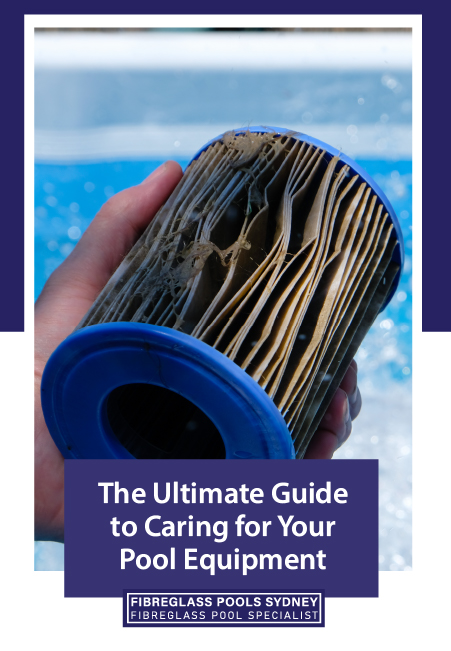
The Vital Components of Pool Equipment
Before jumping into maintenance practices, it’s essential to understand the significant systems powering your pool.
Filtration Systems
Filtration systems are the unsung heroes of pool hygiene. They ensure that dirt, leaves, oils, and other contaminants are removed, providing clear pool water. There are three main types: sand, cartridge, and DE (diatomaceous earth).
Pumps
Pool pumps move water through the filtration system, preventing algae growth and reducing the use of chemical sanitisers. They are the core component for maintaining healthy water.
Heaters
For those who relish a warm swim, heaters are indispensable. From solar, gas, or electric models, they extend the swimming season and comfort levels.
Cleaners
From robotic to suction and pressure-side cleaners, modern technology has made pool maintenance simpler. Automatic cleaners save time and effort by tackling the sweeping and vacuuming on your behalf.
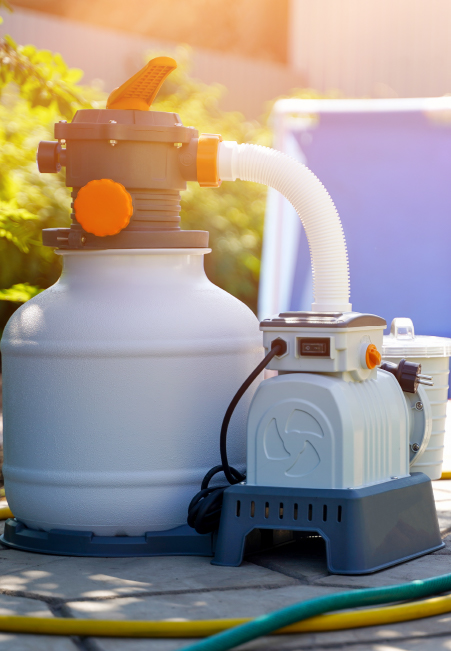
Regular Maintenance Practices
The key to ensuring optimal performance and longevity of your pool equipment is consistent and thorough maintenance. By incorporating a few fundamental practices into your pool care routine, such as checking for leaks, cleaning filters regularly, and monitoring water chemistry levels, you can effectively keep your pool equipment running smoothly for years to come.
Cleaning Filters and Baskets
Filters and pump baskets can accumulate gunk, which reduces efficiency. Regular cleaning, at least once a week, is a quick chore that yields significant long-term benefits.
Checking for Leaks and Cracks
Water can be deceptively destructive. Regular inspections for any leaks or cracks in pipes, valves, and the pool’s structure are crucial. A small issue can easily snowball into a colossal problem.
Monitoring Water Chemistry
Balanced water chemistry is not only crucial for comfort but also for preventing equipment corrosion and scaling. Test your water’s pH, chlorine levels, and total alkalinity regularly.
Inspecting and Servicing Equipment
While the elements outside might not seem harsh, ultraviolet rays and weather changes can impact your pool equipment. Inspect and service your equipment annually. Lubricate o-rings and seals, and check for any wear and tear.
Seasonal Maintenance Tips
Different seasons bring unique demands for pool maintenance. It’s crucial to address specific care tasks for your pool equipment at the appropriate times. This proactive approach not only helps you save money but also safeguards your pool from potential damage, ensuring long-lasting performance and enjoyment.
Winterising Your Pool
For those in colder climates, winterising your pool is essential to prevent freezing. This process involves draining water from equipment, adding antifreeze where necessary, and covering your pool to keep out debris.
Opening Your Pool for Summer
As the weather warms, reverse the winterisation process. Clean your pool, fill it with fresh water, and test all your equipment to ensure everything is operational.
Preparing for Fall
Fall is a transition period, and you’ll want to start cleaning regularly as the leaves fall. It’s also a good time to do a general inspection before winterising.
Troubleshooting Common Issues
Knowing how to spot and fix common pool equipment issues can frequently spare you the need for a service call and help you maintain your pool efficiently. By learning to troubleshoot problems like filter clogs, pump malfunctions, or leaks, you can ensure your pool stays in top condition without unnecessary expenses for professional assistance.
Low Water Pressure
Low water pressure could be due to a clogged pump basket, a dirty filter, or a damaged pump impeller. Start with the pump basket and filter and if the problem persists, contact a professional to inspect the impeller.
Noisy Equipment
Pool equipment should operate silently. If you hear unusual noises, your pump may be running dry or have air in the system. It could also be due to pump bearings starting to wear out. Investigate promptly to avoid costly repairs.
Equipment Not Heating Properly
If your equipment isn’t heating, the issue could be related to water flow or control settings. Check for any blockages or ensure that settings are adjusted accordingly.
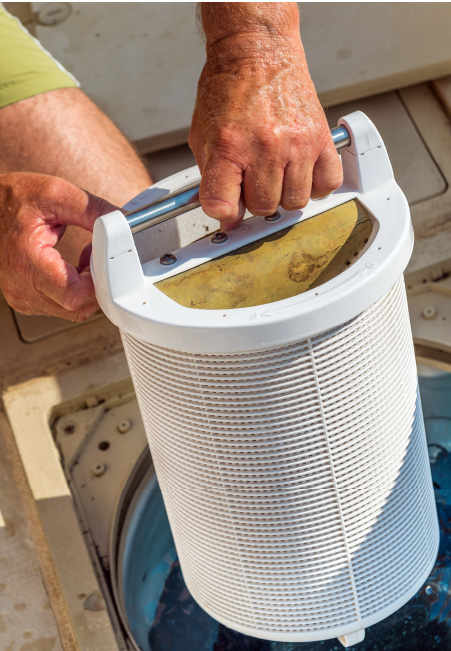
Extending Equipment Lifespan
Adopting a proactive stance towards the upkeep of your pool equipment not only ensures its longevity but also contributes to a more efficient and enjoyable swimming experience. Regular maintenance routines, such as cleaning filters, checking for leaks, and balancing chemicals, can significantly extend the lifespan of your pool equipment, saving you time and money in the long run.
Proper Storage in the Offseason
If you’re in a region that requires you to winterize your pool equipment, proper storage is key. Clean and dry all equipment before storing it, and ensure it’s kept in a climate-controlled area.
Regular Servicing by Professionals
Incorporate professional servicing as part of your pool’s annual maintenance. A qualified technician can identify and rectify issues long before they become problematic.
Upgrading to Energy-Efficient Models
Consider the long game with energy-efficient models. They may require an initial investment but can save you money on utility bills and prolong the need for repairs or replacements.
Conclusion: The Indisputable Value of Proactive Pool Care
Proper care for your pool equipment is not merely about mechanical well-being; it’s about safeguarding your investment in enjoyment. By following this guide, you’re not just maintaining a piece of machinery; you’re ensuring that your pool remains a source of joy, relaxation, and exercise for you and your loved ones.
Remember, a well-maintained pool is more than an amenity; it’s an assurance that you’re creating memories and experiences, season after season. Take the time, implement the practices, and enjoy a pool that’s always ready for a dive.
The Ultimate Guide to Caring for Your Pool Equipment
As a pool owner, it's paramount to guarantee that your oasis remains a safe, pristine, and delightful retreat all year round. While we tend to focus on the visual allure of our pools, like mesmerising water features and intricate tile designs, the core of a top-notch pool setup resides in its machinery and equipment. This comprehensive guide serves as your essential tool in maintaining the intricate systems that power your pool, ensuring you can revel in worry-free splashing for many years ahead.
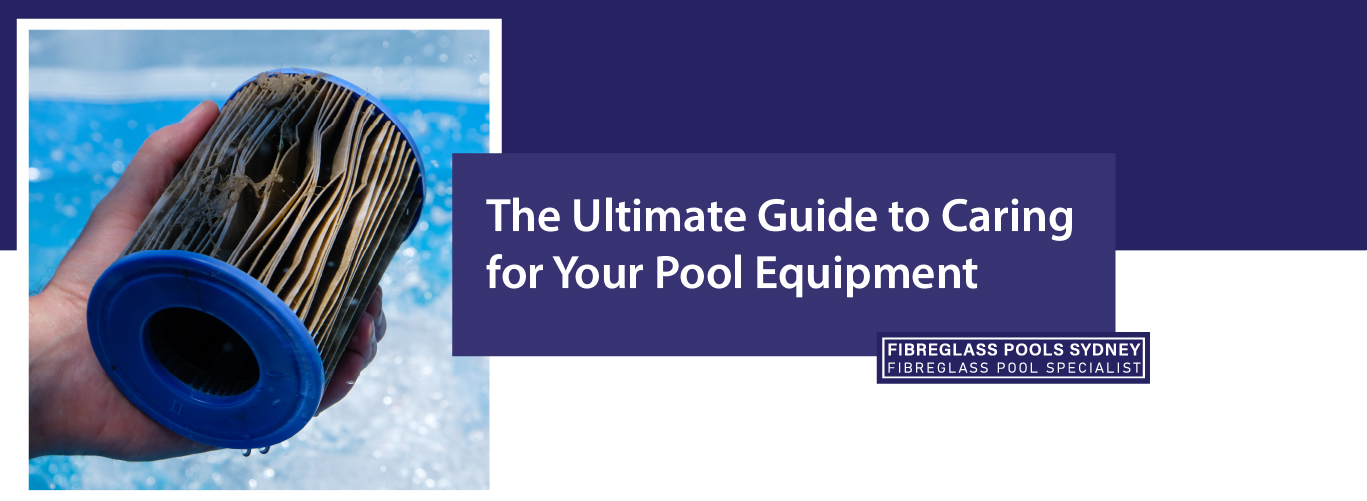
The Vital Components of Pool Equipment
Before jumping into maintenance practices, it’s essential to understand the significant systems powering your pool.
Filtration Systems
Filtration systems are the unsung heroes of pool hygiene. They ensure that dirt, leaves, oils, and other contaminants are removed, providing clear pool water. There are three main types: sand, cartridge, and DE (diatomaceous earth).
Pumps
Pool pumps move water through the filtration system, preventing algae growth and reducing the use of chemical sanitisers. They are the core component for maintaining healthy water.
Heaters
For those who relish a warm swim, heaters are indispensable. From solar, gas, or electric models, they extend the swimming season and comfort levels.
Cleaners
From robotic to suction and pressure-side cleaners, modern technology has made pool maintenance simpler. Automatic cleaners save time and effort by tackling the sweeping and vacuuming on your behalf.
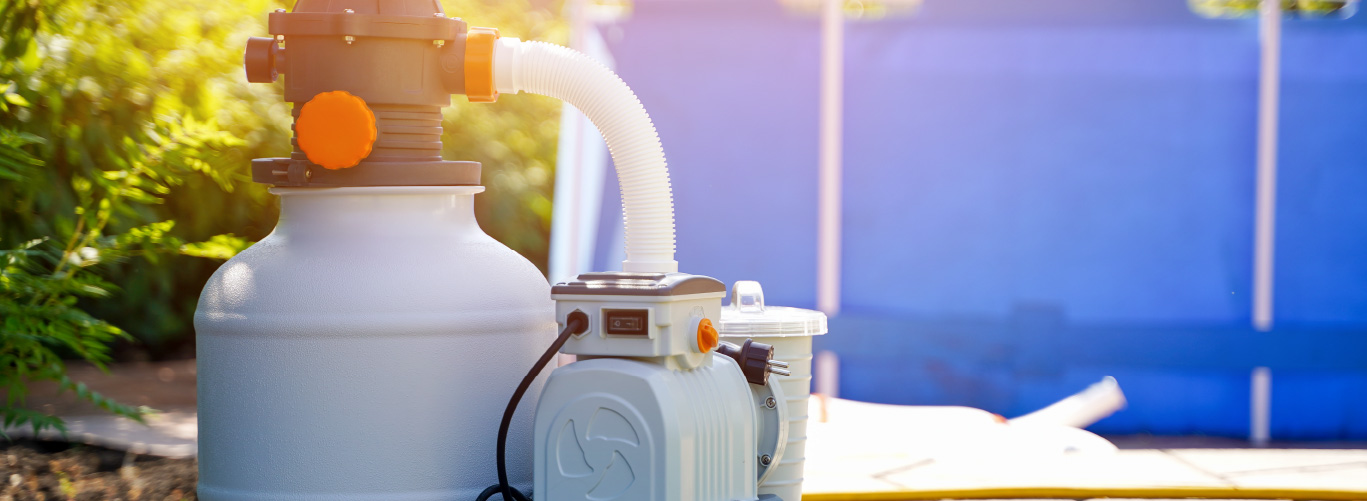
Regular Maintenance Practices
The key to ensuring optimal performance and longevity of your pool equipment is consistent and thorough maintenance. By incorporating a few fundamental practices into your pool care routine, such as checking for leaks, cleaning filters regularly, and monitoring water chemistry levels, you can effectively keep your pool equipment running smoothly for years to come.
Cleaning Filters and Baskets
Filters and pump baskets can accumulate gunk, which reduces efficiency. Regular cleaning, at least once a week, is a quick chore that yields significant long-term benefits.
Checking for Leaks and Cracks
Water can be deceptively destructive. Regular inspections for any leaks or cracks in pipes, valves, and the pool’s structure are crucial. A small issue can easily snowball into a colossal problem.
Monitoring Water Chemistry
Balanced water chemistry is not only crucial for comfort but also for preventing equipment corrosion and scaling. Test your water’s pH, chlorine levels, and total alkalinity regularly.
Inspecting and Servicing Equipment
While the elements outside might not seem harsh, ultraviolet rays and weather changes can impact your pool equipment. Inspect and service your equipment annually. Lubricate o-rings and seals, and check for any wear and tear.
Seasonal Maintenance Tips
Different seasons bring unique demands for pool maintenance. It’s crucial to address specific care tasks for your pool equipment at the appropriate times. This proactive approach not only helps you save money but also safeguards your pool from potential damage, ensuring long-lasting performance and enjoyment.
Winterising Your Pool
For those in colder climates, winterising your pool is essential to prevent freezing. This process involves draining water from equipment, adding antifreeze where necessary, and covering your pool to keep out debris.
Opening Your Pool for Summer
As the weather warms, reverse the winterisation process. Clean your pool, fill it with fresh water, and test all your equipment to ensure everything is operational.
Preparing for Fall
Fall is a transition period, and you’ll want to start cleaning regularly as the leaves fall. It’s also a good time to do a general inspection before winterising.
Troubleshooting Common Issues
Knowing how to spot and fix common pool equipment issues can frequently spare you the need for a service call and help you maintain your pool efficiently. By learning to troubleshoot problems like filter clogs, pump malfunctions, or leaks, you can ensure your pool stays in top condition without unnecessary expenses for professional assistance.
Low Water Pressure
Low water pressure could be due to a clogged pump basket, a dirty filter, or a damaged pump impeller. Start with the pump basket and filter and if the problem persists, contact a professional to inspect the impeller.
Noisy Equipment
Pool equipment should operate silently. If you hear unusual noises, your pump may be running dry or have air in the system. It could also be due to pump bearings starting to wear out. Investigate promptly to avoid costly repairs.
Equipment Not Heating Properly
If your equipment isn’t heating, the issue could be related to water flow or control settings. Check for any blockages or ensure that settings are adjusted accordingly.
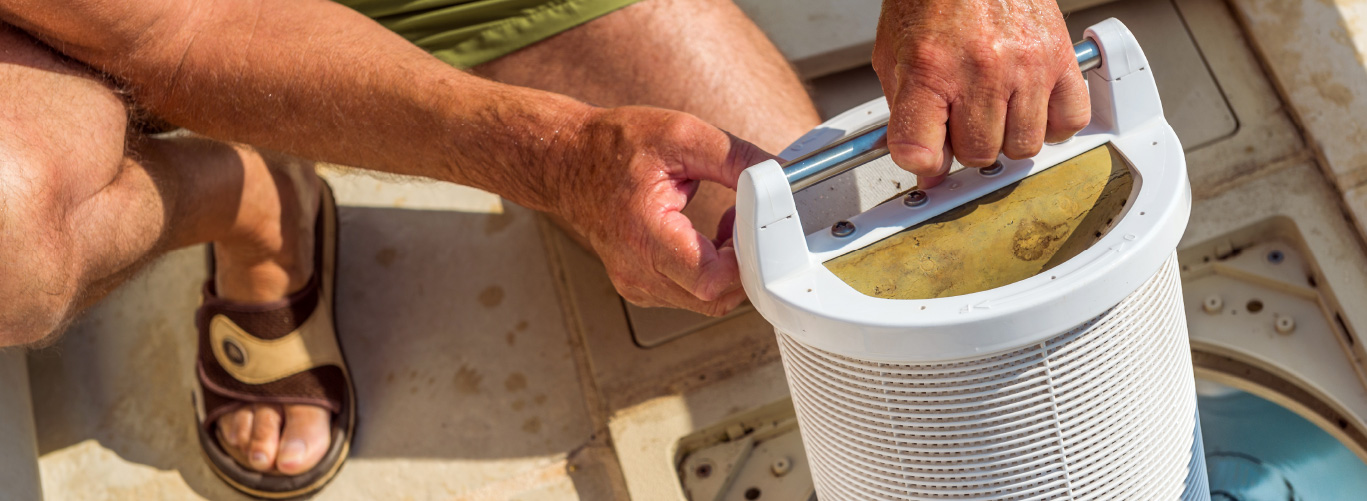
Extending Equipment Lifespan
Adopting a proactive stance towards the upkeep of your pool equipment not only ensures its longevity but also contributes to a more efficient and enjoyable swimming experience. Regular maintenance routines, such as cleaning filters, checking for leaks, and balancing chemicals, can significantly extend the lifespan of your pool equipment, saving you time and money in the long run.
Proper Storage in the Offseason
If you’re in a region that requires you to winterize your pool equipment, proper storage is key. Clean and dry all equipment before storing it, and ensure it’s kept in a climate-controlled area.
Regular Servicing by Professionals
Incorporate professional servicing as part of your pool’s annual maintenance. A qualified technician can identify and rectify issues long before they become problematic.
Upgrading to Energy-Efficient Models
Consider the long game with energy-efficient models. They may require an initial investment but can save you money on utility bills and prolong the need for repairs or replacements.
Conclusion: The Indisputable Value of Proactive Pool Care
Proper care for your pool equipment is not merely about mechanical well-being; it’s about safeguarding your investment in enjoyment. By following this guide, you’re not just maintaining a piece of machinery; you’re ensuring that your pool remains a source of joy, relaxation, and exercise for you and your loved ones.
Remember, a well-maintained pool is more than an amenity; it’s an assurance that you’re creating memories and experiences, season after season. Take the time, implement the practices, and enjoy a pool that’s always ready for a dive.



